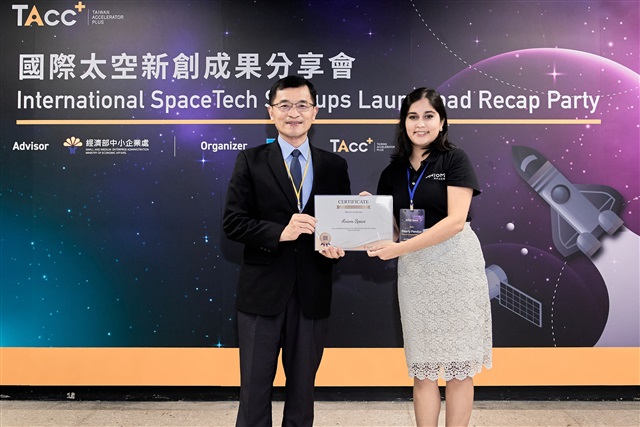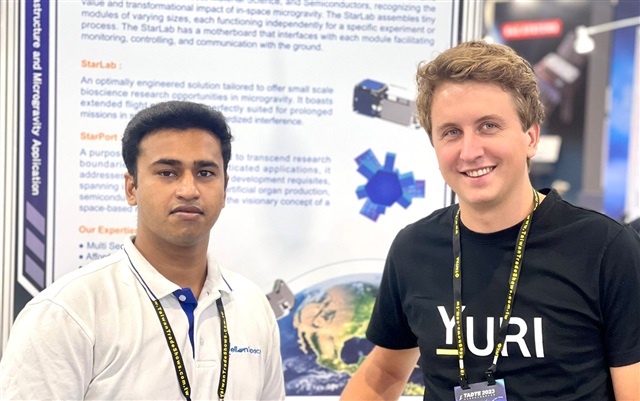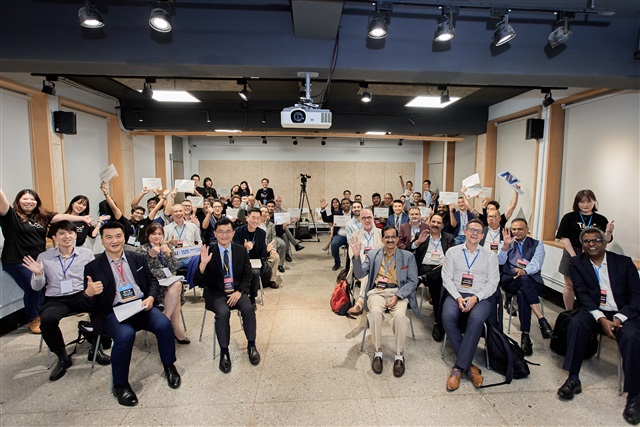To align with global space industry development trends and establish comprehensive solutions for Taiwan's space industry, Taiwan Accelerator Plus (TAcc+), a Taiwanese government-sponsored startup accelerator has formed cooperation with international accelerators and organizations to invite overseas SpaceTech startups to visit Taiwan for a whole month, starting August 15.
With a business tour of Taiwan's IT supply chain, TAcc+ is promoting collaborations between enterprises in Taiwan and the visiting startups, eyeing to fill in Taiwan's SpaceTech supply chain's missing gap, and reconnecting the supply chain with international markets to facilitate the advancement of Taiwan's space industry.
Among the 16 participating companies, US-based Axiom Space, India-based Vellon Space Private Limited, and Germany-based Yuri GmbH are working to advance civilization through leveraging the unique vantage point of research and development in microgravity, as well advancement in biosciences, material science, and semiconductors.
Axiom Space
When asked about Axiom Space's business specialty, the company's In-Space Manufacturing Business Development Manager Pearly Pandya pointed out that Axiom Space was founded to "build for beyond" and develop the world's first commercial space station, Axiom Station, where access to space moves beyond the partners of the ISS to countries, institutions, industries, and individuals with new ideas fueling a human economy beyond Earth.
Axiom Space is led by President and CEO Michael Suffredini, who served as NASA's International Space Station Program Manager from 2005 to 2015 and oversaw the space station's transition from assembly to operation and commercial utilization. Today, he leads the Axiom Space team of experts working toward solving Earth-bound challenges to benefit people everywhere.
Axiom Space provides partners and customers with the unprecedented opportunity to access and leverage the unique vantage point and microgravity environment in space. Axiom Station will feature a dedicated research and manufacturing facility, providing state-of-the-art capabilities for in-space production of advanced materials and biomedical products. Axiom Space's research and manufacturing facility in low-Earth orbit (LEO) will provide opportunities for improved processes and novel products that cannot be created on Earth under the influence of gravity.
Axiom Space operates end-to-end missions to the ISS today while developing its successor, Axiom Station – a permanent commercial destination in LEO that will sustain human growth off the planet and bring untold benefits back home. As the intended successor to the ISS, Axiom Space was awarded the NASA contract to provide at least one habitable commercial module to attach to the ISS.
This arrangement will allow a seamless, cost-effective transition that will continue to facilitate research and innovative development for the private and public sectors. Axiom Space is the only company with the privilege of connecting its modules to the ISS.
The Axiom Mission 2 (Ax-2) was launched in May 2023 at the International Space Station. Axiom Space's crew of four astronauts conducted more than 20 different experiments while aboard the space station. Some of the research conducted on the mission includes initial studies for future in-space biomanufacturing of stem cells (Cedars-Sinai), DNA-inspired nanomaterials (Eascra Biotech), and bioengineered tissue (Wake Forest). These studies will enable a transition to future commercial-scale production on Axiom Station. Axiom Space is also actively working with partners to leverage the microgravity environment and develop higher-quality semiconductors (United Semiconductors) and flawless glass (Flawless Photonics) in space.
Axiom Space is excited to engage with the Taiwanese space community and research institutions to explore manufacturing opportunities in space, for benefit on Earth. The company wants to educate and help drive innovation among Taiwan's growing space industry and the TAcc+ international program offers a great opportunity to meet the people at the forefront of science, technology, engineering, and mathematics.
Pandya's visit to Taiwan Space Agency (TASA) and Industrial Technology Research Institute (ITRI) gave her a more in-depth understanding of Taiwan's ecosystem of the space IT industry and related deployment in semiconductor, electronics, and biomedical industries.
Pandya's discussion with TASA covers many interesting topics such as the possibility of manufacturing niche semiconductor micro-architecture in the microgravity environment and the R&D opportunities targeting special crystal structure development processes for semiconductors. So far, the two sides are still at the stage of becoming familiar with each other and exchanging ideas, but are looking to ascend them to collaborations.
Vellon Space
Vellon Space is a space technology startup, focusing on creating a cost-effective platform for research and advancement in biosciences, material science, and semiconductors, recognizing the value and transformational impact of in-space microgravity.
While operating in space, the company's StarLab creates long-duration microgravity for each module and operational support for their correct functions during the flight.
Vellon Space is currently led by CEO Ajay Kumar, the idea conceiver of the microgravity space lab. He is an aeronautical engineer who worked with an Indian space launcher company in his early days.
The team is expanding selectively bringing in core engineering, domain-specific technical and business expertise with core members including COO Ramesh, the head of business, Rahul, the head of technology, Vidhyuth, and domain expert advisors including Professor Satyan Subbiah IIT Madras and Raghunath Das, a serial entrepreneur for bringing Vellon Space industry connections and business guidance.
The solution offered by Vellon Space is not anything new, but it offers distinct advantages to its customers and users including dedicated payloads, customizable, long-duration microgravity conditions, easy contracting, one point of contact, end-to-end management, and technology edge.
Vellon Space recently announced a partnership with IIT-Madras to explore the potential of space-related technologies with the collaboration involving joint research focusing on creating technologies such as ZBLAN fiber-optical crystal growth, diamond growth in space, and lab-on-a-chip for biological applications.
Additionally, Vellon Space has formed partnerships with the bioprinting research team at the University of London, as well as with Aniosoprint and Luxenberg additive manufacturing company. The company is also working with other research institutes in India to further its mission of advancing space-related technologies.
Vellon Space has forged partnerships with international companies engaged in building cargo return services, biological instrumentation, and research and development institutes.
Seeing Taiwan's leadership in semiconductor research, Vellon Space eagerly extends its hand to join forces with Taiwanese industries and research institutions, looking to forge collaborations that synergize semiconductor excellence and biomanufacturing innovation. Vellon Space expects the cooperation to create benefits for both sides.
Vellon Space will showcase its StarLab technology and application in microgravity research and manufacturing at the Taipei International Aerospace & Defense Industry Exhibition and is happy to collaborate with various sectors in Taiwan to provide access to space in advancing innovation.
When asked about his trip to Taiwan, Vellon Space CEO Ajay Kumar said he was excited to work with Atgenomix, one of the top bioinformatics startups in Taiwan, to conduct biomedical research in space and HelioX Cosmos is a Taiwanese commercial space service provider on space biochemical research and experiments, microgravity material research, satellite launch and integration, memorial spaceflight, deep space business development to promote Vellon Space to its Global customers in research, academia and industry to conduct long-duration microgravity research, particularly those from Biotechnology and Semiconductors sectors. According to Vellon, microgravity in space influences bioprocessing techniques. Research work in space can pave ways for bioengineering and regenerative medicine breakthroughs.
Taiwan has just started building space infrastructure as Vellon also plans to launch its StarLab in the coming years and is looking to work with ITRI on space-related semiconductor manufacturing research.
Yuri
Yuri is a space biotech company with a team of more than 30 space engineers and biologists that enable science research in microgravity for scientists and pharma industries worldwide. With an in-house science team, Yuri is developing a pipeline of space biotech products and collaborating with researchers around the globe.
For the new generation of space stations and capsules, the company's space incubator ScienceTaxi with ScienceShell portfolio can add state-of-the-art life science capabilities. Designed for maximum compatibility, Yuri can easily equip its solutions to any new spacecraft.
Yuri's Clinostat and Random Positioning Machine (RPM) are affordable entry tickets to microgravity research. They simulate microgravity conditions 24/7 within the comfort of the user's lab.
Maria Birlem, Christian Bruderrek, and Mark Kugel established Yuri in 2019. Their collective experience at Airbus involved executing microgravity experiments on the ISS, where they facilitated numerous projects for academic institutions and space agencies, both deploying to and retrieving from the ISS.
By the close of 2021, the executive team welcomed Daniela Bezdan as the Chief Scientific Officer. The company's moniker, Yuri, pays homage to Yuri Gagarin, the pioneering astronaut who became the first human in space.
Yuri offers a 10x reduction in cost and time compared to traditional space agencies. This significant decrease enables quicker, more affordable access to space for diverse scientific endeavors.
The team of Yuri is uniquely composed of both space engineers and space biologists. This interdisciplinary approach ensures a profound understanding of both the technical and biological nuances of space experiments.
Yuri also had a successful experience with the Cellbox-3 mission in collaboration with DLR. For this mission, the company transported bone marrow cells for Charite in Berlin and nerve-muscle cells for Goethe University Frankfurt to the ISS. The primary objective was pioneering cancer research, and the results have been groundbreaking.
Yuri is also in the advanced stages of developing the first biotech products formed in space. The launch of these products is slated for the end of this year, marking another significant milestone for the company.
The visit to Taiwan comes with clear objectives and high hopes for fruitful collaboration. Yuri's primary goal is to expand its presence in Asia. Taiwan, with its technological prowess and strategic location, serves as an ideal hub for Yuri's expansion in the region.
Yuri GmbH's Space Access Lead and Sales Engineer Felix Steiner is set to visit TASA and ITRI to strive for business opportunities and is also looking to get a clear picture of Taiwan's current development of space technology and industry development.
A key facet of Yuri's mission is to join forces with the Taiwanese biotech industry. Leveraging our collective strengths, Yuri is enthusiastic about the prospect of co-developing innovative therapeutics addressing unmet clinical needs.
At the upcoming Taipei International Aerospace & Defense Industry Exhibition on September 14-16, Yuri will showcase some of its most exciting and innovative advancements including the unveiling of a model of Yuri's space incubator, the "ScienceTaxi."
The cutting-edge technology is scheduled for its maiden flight in the first quarter of 2024, with its destination set for the International Space Station (ISS).
At its booth, the German company also expects to interact with more Taiwanese companies and is eying to collaborate with Taiwan's supply chain, academies, and institutions to explore the potential businesses within the space biomedical and pharmaceutical industries.
Yuri Lab as a Service is the company's comprehensive service for microgravity experiments. Yuri's ScienceShells, the small bioreactors designed specifically for space life science experiments, will also be on display.

International SpaceTech startup launchpad recap party

Ajay Kumar from Vellon Space (left) and Felix Steiner from Yuri (right), MOU signing ceremony



